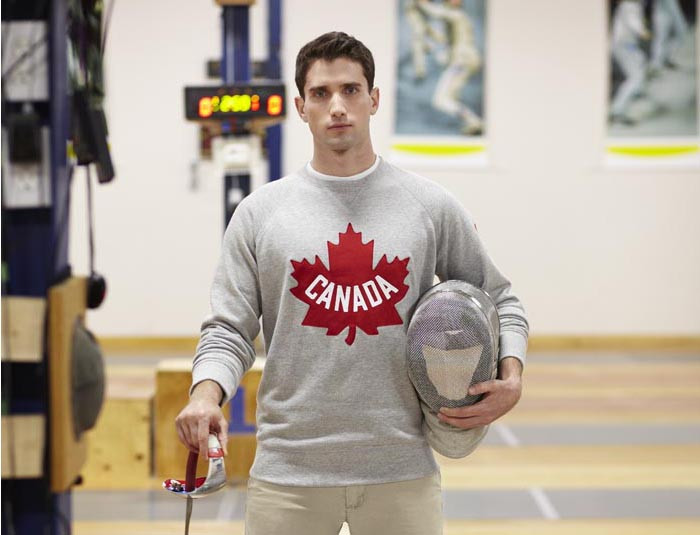Fencing for Glory
Concordia Fencer Takes Second Shot at Olympic Gold
“You are completely focused,” said Philippe Beaudry, discussing his mental preparation for a fencing match.
“You can practically feel the adrenaline dripping from your ears. You feel like a bull, and all you can think while looking at the other guy is,
‘I’m going to beat you. There’s no way I’m not going to beat you.’”
An incredible fierceness overcomes Beaudry when he speaks about the experience of getting focused for a bout. His intensity in conversation only amps up for the real thing, and he’ll have the chance to bring his determination to the world stage four months from now.
That’s when Beaudry, a part-time Concordia finance major, will be participating in his second Olympic Games in London. Currently ranked 20th in the world by the Fédération internationale d’escrime, he will be representing Canada in the men’s sabre competition—the fastest of the modern fencing weapons.
Beaudry is already a decorated fencer despite his young age. He’s won the Pan American Games twice and has been a Canadian fencing champion a whopping seventeen times.
Beaudry, who just turned 25, was well-served by his first Olympic experience in Beijing in 2008, where he got a taste of what it’s like to compete against the best fencers in the world.
“Beijing was an awesome experience, I have to say,” said Beaudry. “I finished 30th out of about fifty people, so I was pretty happy about that. I definitely didn’t have as much experience as I have now. I had a different coach then, the coach I have now has more experience and we’ve worked on a lot of things the past four years.”
His current coach, Dmitry Ronzhin, was brought over from Russia as head national coach in 2009 as a result of increased funding from Canada’s Own the Podium campaign. Beaudry credits a lot of his recent success to Ronzhin’s vast experience and fencing knowledge.
“He’s a very qualified coach; it’s been three years I’ve been working with him now,” said Beaudry. “The hardest part is the adaptation, but then the results start coming and this year was a good year for me.”
This time around, however, the expectations are much higher—Beaudry is going for gold.
“We always want to win,” said Beaudry. “It’s a dream of mine to make a podium. The highest Canada has finished in fencing at the Olympics is fourth, so definitely hope to get to the podium [this year].”
Beaudry lists his father, Paul Beaudry, as his biggest inspiration. The elder Beaudry was a prominent fencer for over a decade, having been a national team member and Olympic athlete in his own day. Unfortunately for him, the 1980 Moscow Olympics he was slated to participate in were boycotted.
“I’m extremely proud of Phil, there’s no question,” said Paul. “He’s doing extremely well, and for me and my wife it gives us the feeling of being part of an Olympic Games. It’s incredible to be able to live through something like the Olympic Games with my son.”
While being able to call oneself an Olympic athlete is well worth the effort, the challenges of staying at the peak of any sport while balancing a regular life are certainly taxing.
Throw in the issue of financial aid and funding, and the life of an Olympian doesn’t sound as glamorous—but Beaudry has managed to persevere through all of the obstacles he has been put up against.
“Because there is less recognition for amateur sports, it is harder to get financing,” said Beaudry. “This year I had to finance all of my tournaments myself, it was very hard. There is some money from the government, and luckily Quebec has the best funding program for amateur sports in the country. Despite all this, you still have to work, and it’s hard energy-wise when you have to work and train.”
Beaudry is also proving to be a role model; he is part of Jouez Gagnant, a Quebec based group that sends athletes to give speeches to young kids in schools to provide motivation to pursue their dreams in all aspects of life.
Despite his supreme talent, Beaudry’s still unsure of how far he wants to take his fencing career, a mindset ushered in by a life-changing experience a few years ago.
“After Beijing, I told myself I would be going one year at a time,” said Beaudry. “A lot of things can happen in a year. I fenced for two years after Beijing, but then I
got into a car accident and I thought about quitting. I was lucky in the car accident. If the impact had been a metre more to the left I would have been killed.”
“Stuff like that put things in perspective—I love fencing, but maybe I want to try something else. I took a few months off to try some other things and to meditate on [the accident]. When I decided to come back to fencing, I came back for the good reasons, and I’ve had the best season of my life.”







